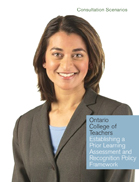|
|
Qualifications recognitionCollege consults on prior learning assessment
English- and French-language sessions have been held in four Ontario centres – Toronto, Ottawa, Sudbury and Windsor – with representatives of organizations who work with teachers and members of the College. Registrar Brian McGowan emphasized to participants at the Toronto session that Prior Learning Assessment and Recognition (PLAR) “is not an alternative pathway to being certified in Ontario. It is a mechanism for individuals who have been certified to teach in another jurisdiction to have their teaching-related knowledge and experience considered alongside the professional preparation that led to their previous certification.” The College provided participants with background information in advance and with a number of scenarios involving fictitious applicants with backgrounds that reflected the experience of real-life applicants. Participants were asked for their thoughts on the principles and scope of a PLAR policy, the kinds of assessment that might be used and who might conduct the assessment, and the implications of such a policy for the teaching profession. “Participants said they were very pleased with the information we were able to get to them beforehand,” said Margaret Aubé, who is leading the PLAR project. “It enabled them to engage fully in the discussions and give us very useful feedback. “We will use what we learned to draft a policy framework to present to Council for approval later in the year. The framework will provide a base for developing a PLAR policy and procedures for its implementation. It will not likely be operational for some time.” Carol Norton-Sargent, project manager of Teach in Ontario, which helps internationally educated teachers get certified in Ontario, said the consultations were another example of the College’s efforts to recognize the skill and experience of internationally educated teachers who apply for certification to teach in Ontario. “Participants I spoke to expressed a lot of appreciation about being included and I found the experience illuminating,” says Norton-Sargent. “I was amazed at the complexity of the issues and the College’s need to serve the public interest as well as carry out its responsibilities in a manner that is fair and equitable to applicants.” Nuzhat Jafri, Executive Director of the Office of the Fairness Commissioner, which was asked to participate, echoed those sentiments. Jafri said that the consultations were very constructive. “It’s always positive to look at alternative ways of assessing qualifications,” she said, “and we look forward to the results of the process and learning more about the College’s plans for prior learning assessments.” Leslie Mantle, principal of the Chelmsford Valley District Composite School in Sudbury, also found the consultation a valuable process that helped her to develop a perspective on the need for PLAR. “By expanding our certification process to include PLAR, we make our profession more attractive to experts outside of Ontario,” she said. In 2006, the College Council recommended the development of a policy framework for determining criteria, processes and procedures for implementing PLAR. “A number of initiatives and developments have brought us to this point,” said Registrar Brian McGowan. “We’ve gradually become aware that we need to do more to recognize the breadth of the teaching and teaching-related experience that internationally educated teachers bring to our profession. Legislative changes support the idea that applicants may not be able to provide the necessary documents on which we currently base certification.” College staff has also been researching PLAR policies and practices in other jurisdictions and developing a set of working principles – including accessibility, accountability, equity, the right of appeal, transparency and fair assessment – that might provide a foundation for the implementation of a PLAR policy. |










 The College has launched
The College has launched